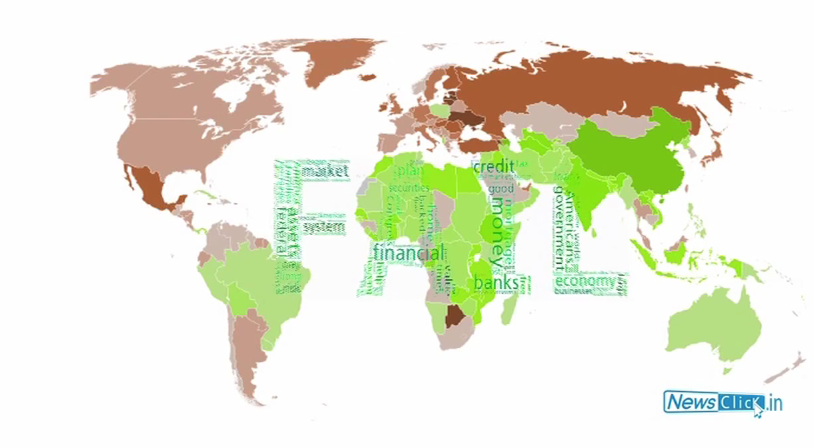Financial Crisis and Banking Regulations
Newsclick discusses with Professor Mario Tonveronachi from the University of Siena, Italy about the global financial system and the crisis it continues to face. Speaking of banking regulations, Tonveronachi says that it is a problem of not having the comprehension of a financial system in its entirety. Therefore the regulators did not see the crisis coming. He underlines that governments should look at the structural problems of an economy and concentrate on tackling them. He also emphasizes the need to have many small banks and feels that banks should perform purely banking operations, as they did in the good old days.

Prabir Purkayastha (PP): Hello and welcome to Newsclick. Today we have with us Prof. Mario Tonveronachi from the University of Siena, in Italy to discuss the financial system, the crisis it is still in. You have looked at the financial system, you have some very strong critiques of the financial system. But do you think anything has really, significantly changed after the crisis that we saw from 2007, 2009 and it still continues.
Mario Tonveronachi (MT): Well, not so much because in reality there are more words than facts. And what has been made up to now in many cases, specially in the banking sector has been to change some things of the previous regulation that were weaknesses, distortions and so on, particularly important. But this does not mean that the new regulation is strong. I mean, if the past regulation were weak, you improve but it doesn't mean that you have reached a new satisfying position. And, after all the approach has not changed. The approach is substantially to follow the banking practices. I make an example. Banks have to measure there own risk, internal risk, in order to know more or less how much reserves and how much capital is to be put aside. This is they call, the economic capital. Well, our problem is the following. The regulation on banks, what it is doing is to bring the best practices of the banks and transform them in regulation, which means that the regulation is going towards what are the best practices of banks and not the.. the regulators do not start from a different standpoint – from a very large social, political, economic standpoint, looking at the entire society and the economy. But they follow the practices, the best practices, at least of the banks.
PP: So, what your critique has been is that, you really are internalizing the basic philosophy which the banks are following; not really examining that and focussing on fine measurement of risks and not really at the structural problems that are there today.
MT: Yes. You know, in a market economy, the banks make their own business. It's all right. No problem. But it's not the business of the government. The business of the government is to look at the structural problem that an economy may have, at problems of employment, welfare and so on, growth, okay. That is a real different matter, because it's very simple. If the regulation goes after a problem of only... we can also imagine that it's very strong as a regulations, but if it is so strong that it may kill the banks, in the sense of putting the banks in a position to finance the economy. So, in a sense, what I say in general, this type of regulation has not a reference, analytical and empirical reference to judge how much strong, because it starts from the wrong point of view. It doesn't start saying I want the banks to finance the economy then they must behave in this way. Okay. You start from the other point. I do not want the banks to fail. Okay, but it doesn't serve anything, you know.
PP: Could ossify everything.
MT: Could ossify. Make or leave banks to make the most grave disasters as we saw recently, or at the opposite they may ossify the system and doesn't serve any more. You see, it is the wrong point of view, the wrong starting point. Look at in this way at the regulation of banks.
PP: What you are saying is if you want to regulate the bank, you must see what is the bank's role in the larger economy, what is direction you want the economy to grow or go and then look at what are the instruments of regulation for the banks to deliver that?
MT: Sure, that's the point. The important point is that, if you start from this perspective, you reach a different conclusion from the one that they are following now. Now they are following a position in which you have an international standard for regulation. Brazil is an international standard that it should be adopted by every country. If you start from the other perspective, you have the necessity to calibrate your regulation to your own problems, to your own country. Okay. So, it's a rather different story.
PP: So, one size shoe fits everybody kind of principle doesn't work, because economies are different. The other critique that you have had, is that one of the things you see, in fact, two things that you have said in various papers that you have written is that, one is that this micro calculation of risk that that's what is actually is a mythical calculation; there's no basis in reality because it does not see the system risk; it just sees every instrument risk. So this kind of innovation is meaningless, it doesn't produce the kind of output a society needs and the second criticism that you also make is that essentially this does not take into account that the economies, the financial systems are all inter connected and therefore regulating one part while letting others completely free will not solve the problems of the economy. So would you like to tell us something little more about it?
MT: Yeah. The first point, let us put it this way. We live in an uncertain world. That's our problem because our decision today depends on what we expect for tomorrow but the tomorrow doesn't exist without our decision today. This means that in reality, the concept of risk and the concept of uncertainty are two different concepts because I agree perfectly that banks must, in some way, compute their risk. For this, they use their best methodology, the best methodology they have; but they know that they may be wrong. The problem is why the regulators adopt these methods that they are not confident. I mean methods that you know that tomorrow...let me explain. The bank supervisors must put their seal on the methods that the bank is adopting on the data it is adopting, on the results. At the end, the supervisors say, I am satisfied or I am not satisfied. But if they are satisfied, they say, ok, that's all right. Okay. That's alright, what? A measure of risk, we have statistical methods that may in 1 week show that all the results you expected are wrong. As an example, in Europe, the European banking authority made a stress test on the bank in order to see the banks that needed more capital had some problems. There are also other bank like Dexia that passed without problems. Three weeks after that was failing. Okay. That's the point. I mean, it is not because or not only because the supervisors are not good. It is the problem, that you cannot put a regulation, supervision on this track of machineries because risk is one thing and uncertainty the other. They should put the situation in other perspective. The perspective eventually to decrease the degree of uncertainty and then let the market work.
PP: So, what you are saying is that uncertainty in some sense is something the regulator should look at, reduce the uncertainty; what banks can or cannot do, what kind of exposure it should or shouldn't have; while the risk is calculating a more arithmetic issue and calculating something which is internal to the bank but does not really deal with its external interface, the real economy.
MT: Yeah, because, look at it. It's not much different from a general – what should be the role of the State. Role of the State should be to organize the society in order to protect the society from shocks or to avoid internal shocks. Okay. It's not different. I mean, the structure that the State should require, the financial system to have, should be in such a way to not eliminate because it is impossible, but to limit the degree of uncertainty. Then we know that everything may happen. We can structure the system in order to have the less serious consequences. Okay. Obviously if you have a mega bank, whose assets are a multiple of the nation's GDP, okay, you have problems if these banks fail. If you have many independent banks – small, medium size banks, as in United States, in these last three years, we have in United States more or less 400 small banks that failed. Nothing happened. Okay. So, it's a different way to look at the structure of the system. Okay. There is an important difference because, in which the academics have some....
PP: Culpability..
MT: Because the improvement, innovations in financial mathematics and statistics, it all seemed that we could measure everything; we could forecast everything. Okay. But okay, you can be wrong once, you can be wrong twice; but then you must learn. I mean, after the very large American funds, ...failed, in the committee there were at least two Nobel prizes; okay. Well, okay. You must realize that this is not the right way to go on. Okay. It was a very large hedge funds that required to... the intervention not with the money, but the organisation to reach a resolution with the Federal Reserve of New York in order not to make it fail because, it would have had serious consequences. The problem is with this type of regulation we have spoken upto now, you regulate banks, you regulate investment funds, insurance company and so on...each one looking at in a sectoral way its own problems; not looking at the financial system in general. This means that if you decide to regulate one sector in a very stringent way but you leave the entire sector to innovate to make new problems, to make new institutions, obviously we have what we have, what is called the shadow banking sector. That is much of the activity with some innovative products are put outside of the regulator sector. Okay. It is always difficult to know how much to regulate, how much strength to put in a regulation of one sector and the other, so the regulators are always after the things that happened, okay. They did not see this crisis coming. Few people saw this crisis coming. But this is a problem of not having in general the comprehension of a system in its entirety. Okay. There are very few small and very simple things, specially if we follow some perspective like given by the...theory. The problem in the economy is debt, okay. Because you, in order to go into the future, for instance, we make investments for the future. You must go into debt. Debt means that in the future you must have enough money to pay the debt, to serve the debt. That's the problem because tomorrow you cannot have this money and so you have the problems of failure, the debt, you may feel the creditor may go into trouble because later and so on. It should be very simple to look at the system and see how much you are near a position to frequently serve the debt. In reality, also the information that the supervisor, that the State should acquire and we have not enough now should be related to how much a family, a firm, a bank is near a point in which it may be difficult for it to serve the debt. If you see that the point is near, you must intervene. Something rather simple, but...
PP: Lot of this gets clouded because of the so-called new innovative instruments which leverage on a certain pool of money, on assets and then really go into derivatives and so on and each of them as removed from real economy it becomes more and more difficult to co-relate the two. At the end of it, you risk real economy for that so-called instruments you have created.
MT: Yeah. You have a different problem. One problem is that the financial system that should serve the economy may go in other direction to serve the debt...
PP:Which is what is happening now. Appears to be..
MT: The point is, instead of helping to create wealth, in this way it is trying to extract wealth.
PP: Redistribute the wealth..
MT: Yeah, in its favour. Okay. But in this way, the game is much wider because also there's a call on the real sector going to the same game. In the last years we have seen a lot of non-financial firms going into the speculative game. Okay. Not making real investment, but financial investment. So, you have a distortion of the primary duties of the financial system. The innovations that are made infact are not an innovation. In reality, many of these instruments are just mathematical exercises made by people with a degree in physics and not in economics; they do not understand anything of economics. Okay. They make this type of instruments and there are people in the same financial firm who do not understand what the other had done and they go and sell. Okay. The result is the people who produce do not understand the economic consequence. The people who sell does not understand what he is selling, obviously the people who buy does not understand what he is buying. Very often it is said that only people with a Ph.D degree can understand. No. it is not true. People with a Ph.D cannot understand the consequence of one new instrument. If I do not give him another information, how much of this instrument I create and how I distribute it because this is a problem – in the whole world one billion of junk books is nothing, okay, they fail nothing happens; if you multiply and make one hundred trillions, that's a big problem, with the same instruments. Okay. But the people who create these instruments does not know at the beginning how much of this instrument will be created. This is a very important point. The other important point is, for instance the problem of a gene, the insurance company that failed in United States because at the moment in which the party is really is fine you can gain a lot of money, is not distributed; you concentrate. So successful instrument does not obey to the first law of finance to have a differentiated portfolio. Okay. Then you do not know what happens in terms of the total value you create because as you said you are creating a pyramid over, eventually, one dollar of real asset. Okay. You create all this pyramid, several layers with a big liquidity leverage. Because that's what we have seen in this crisis. It's the liquidity leverage because you create trillions and trillions and trillions of nominal values in this market or not-market because many are over the counter instruments that are not attained in the markets. And then in the old times you had the bank money that was at the base. Obviously the banks are in the same game; you have not an independent source of liquidity. Then you are only with the liquidity of the central bank. What happened? The central bank intervened; multiplying the balance sheets. But it cannot be enough because the balance sheets of a central bank cannot in a few days go from one billion to 3000 trillions. Okay. So when the balloons go down, you have very little things to do.
PP: What are the lessons learnt from the failures? Do you think any change has taken place or do you think it needs more such shocks before, or political movement to really re-orient the way the financial system is moving?
MT: I do not think that we must think of the system, in the sense of the private system to lead something because they are after money. Okay. Yesterday, today and tomorrow. So the problem is how much have the authorities have learnt, what are the lessons that they have learnt from the crisis. My opinion is that they also now do not understand what has happened. That's the point.
PP: Still have not understand..
MT: Still do not understand. I don't want to be too harsh but I think that fundamentally that have not a good theory. They make models that fail and say, “oh, this model failed; yes, I change something. Okay. Now its working.” After one year, it fails again. You must know that the central banks use models that do not include the financial system. Central bank looks at the financial system by definition as its own model of interpretation of economy and the model does not include the financial system. Very good. That's the story.
PP: So, future crisis and ultimately political movements have to correct, society has to correct finally the regulator because if the regulators do not correct the financial system, then they are the ones who need correction.
MT: Yeah. I think we must go for simplicity. Ask very simple questions – what do we need? not what they need; okay. What do we, as a society, need. We need that bank, as in the old good time, collect my deposits and then look very well after the merit of the people who go to the bank to ask loans. This is what we need. Basically. Okay. This is what the current regulation and Brazil 3 is from this point of view even worse than the one before because as it goes today, small banks who makes this type of activity because in Europe, in Unites States, I do not know here in India, but in United States the small banks make this type of activity and the application of Brazil 3 makes it difficult to go in this way because they must follow the guidelines. In these guidelines you have no equal appreciation, you are not looking in the eyes of the people who come to you asking for money, asking for loans. These guidelines are no, because you must put numbers. Okay. There are a lot of small banks in United States that are very contrary to the application of these methods just because it is contrary to the relation of long period customer relation they have with the small community in which they live.
PP: Good, thank you very much. It's been very interesting discussion and it's also interesting to watch that some of the political movements have started talking about community banks, supporting community banks and so on, as a counter to the kind of financial collapse that has taken place. Let's see how that goes, but at the end of it, it is not the regulators learning from the banks but society teaching the regulators the way it should be; that means at the end of it, politics of it has to be set right. Thank you very much.
MT: Thank you.
Get the latest reports & analysis with people's perspective on Protests, movements & deep analytical videos, discussions of the current affairs in your Telegram app. Subscribe to NewsClick's Telegram channel & get Real-Time updates on stories, as they get published on our website.
























